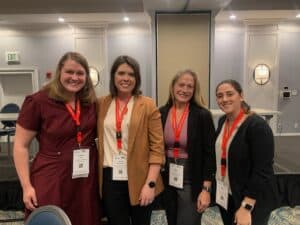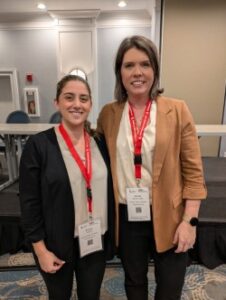Andrea Barton-Hulsey, PhD, CCC-SLP, Assistant Professor at the School of Communication Science and Disorders (SCSD), recently presented on a new early literacy instructional approach at the Council for Exceptional Children- Division on Autism and Other Developmental Disabilities Conference (DADD).
 Alongside Barton-Hulsey was her PhD student, Brianna Coltellino, as well as collaborators Dr. Elizabeth Biggs and PhD student Rebecca Gianforte from Vanderbilt University. They presented about a novel intervention approach funded by an FSU SEED grant awarded to Barton-Hulsey, titled “Play and Read with Me: Early Literacy Intervention for Young Children with Limited Speech”
Alongside Barton-Hulsey was her PhD student, Brianna Coltellino, as well as collaborators Dr. Elizabeth Biggs and PhD student Rebecca Gianforte from Vanderbilt University. They presented about a novel intervention approach funded by an FSU SEED grant awarded to Barton-Hulsey, titled “Play and Read with Me: Early Literacy Intervention for Young Children with Limited Speech”
Play and Read with Me is an early literacy program for 4–6-year-olds with limited speech. The program uses strategies within motivating contexts of a child’s favorite toys and books to encourage learning of letter names, letter sounds and phonological properties of words. These strategies are combined with engaging shared activities, to also promote language development.
The program uses Augmentative and Alternative Communication (AAC) to instruct the children. Barton-Hulsey explained how “one form of AAC is an iPad that uses speech output when vocabulary and letters are selected. New technology allows for keyboards to be used that also produce the sounds of letters, an important component of early literacy instruction that we know supports the development of decoding skills—or the ability of children to ‘sound out’ words to read.”
 “It was developed out of the need to provide equitable access to reading instruction for children with developmental disabilities who use limited speech during preschool and Kindergarten. This difficulty with communication early on can limit the amount of early literacy instruction that teachers and speech-language pathologists provide,” said Barton-Hulsey.
“It was developed out of the need to provide equitable access to reading instruction for children with developmental disabilities who use limited speech during preschool and Kindergarten. This difficulty with communication early on can limit the amount of early literacy instruction that teachers and speech-language pathologists provide,” said Barton-Hulsey.
While presenting at the conference, Barton-Hulsey and her team had the opportunity to connect with fellow professionals and gain valuable insights that will help guide the project’s continued development.
“The DADD conference is highly attended by special educators and researchers across the country who are invested in supporting children with developmental disabilities. It was great to get feedback from them about this work while also share this novel approach to early literacy instruction,” said Barton-Hulsey
The overall goal of this project is to ensure equitable access to early literacy instruction for children with developmental disabilities while also supporting teachers in overcoming challenges they may face in the classroom.
Presenting at the DADD conference was an opportunity to not only share innovative approaches to early literacy but also to hear from educators and researchers across the country who are equally committed to supporting children with developmental disabilities.

